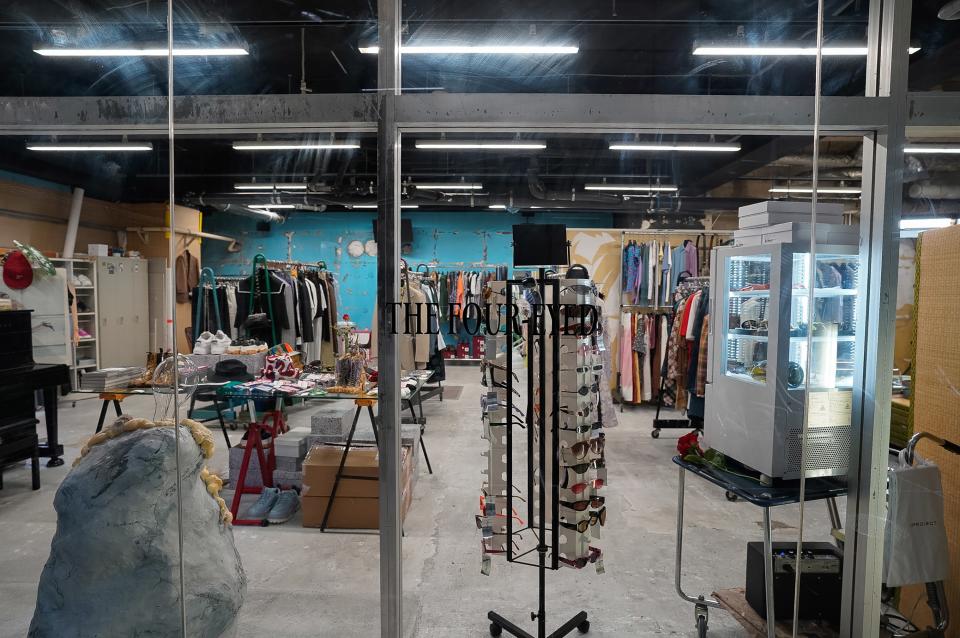Why the Coolest Shops in Tokyo Want to Stay Secret
Kabukicho: Tokyo’s red-light district, soaked in neon and populated by pay-by-the-hour love hotels, Yakuza-owned hostess bars, and countless vending machines depositing cans of Boss coffee to weary salarymen. Who would imagine that one of the city’s most influential boutiques might exist anywhere nearby? And yet, there it is: The Four-Eyed, squirreled down an unassuming alleyway filled with those aforementioned hotels. “I wanted it to be a bit hidden when I opened it,” says Keisuke Fujita, the happy-go-lucky shopkeeper and street style photographer who opened the store in late 2016. “I want people to feel special when they come to The Four-Eyed, like they’ve discovered something. It’s like treasure hunting.”
On its racks you’ll find experimental pieces from London designers like Charles Jeffrey, Mimi Wade, and Martine Rose; a tightly curated selection of vintage sportswear; and a slew of international labels unlikely to be found elsewhere in the country. (Ottolinger, Neith Nyer, and No Dress are just some of the brands The Four-Eyed has introduced to Japan.) “For me, the most important thing is the independence and individuality of the fashion designer,” Fujita adds.

The clandestine location has leant The Four-Eyed a measure of exclusivity, but choosing Kabukicho was a risk. “On the first day I thought that I’d just sit in my shop and nobody would come,” Fujita says. To his surprise, the air of privacy has worked entirely in his favor. The circle of stylists, editors, and other fashion vets who inhabit Tokyo is inherently small, so a shop like The Four-Eyed feels like a natural fit—one reason why it has become a favorite among insiders like Japanese celebrities KOM_I and Nana Komatsu and the stylist Lotta Volkova, who visits the city often.
Much like The Broken Arm in Paris and the now-defunct Colette before it, Fujita says the most important thing about The Four-Eyed is the community around it, which Fujita was able to build through the contacts he made as a photographer. “I could invite them to the shop, and it meant that I could spread it through them on Instagram or whatever. As social media continues to be more popular, influence from magazines is decreasing in Japan and there’s space for a new kind of business.”


A new kind of business it certainly is: The Four-Eyed’s Instagram feed has as many editorials and original content as you’d find on that of a fashion magazine. Better yet, everything is created by the up-and-coming creatives who orbit the shop—aspiring stylists or models can be found working the floor, producing shoots for Instagram, and networking with regulars (it’s not unusual for people in the industry to meet at the store before going out for drinks). The Four-Eyed hasn’t had a day without sales since it opened.
Fujita is not alone in his approach. Spaces like fethers goffa x—a low-key retail space behind a nondescript brown door in Harajuku that sells everything from new season Xander Zhou to vintage Levi’s—and High and Seek—a women-only shop down an Aoyama backstreet—have been around for years. “A quieter location simply means we can serve our customers better,” says Tatsuya Okuyama, the sales director of Jackpot, an appointment-only menswear and magazine haven hidden on the seventh floor of an old Shinjuku building that also houses a game center.

“It means that people don’t wander in here by accident,” Fujita says of the hidden appeal. “Because people find out about us through Instagram and through their friends, it means they come here for a purpose.” Jackpot’s Okuyama echoes this sentiment. “We used to be a roadside store, but wanted to feel a little more private for our customers, so relocated to the seventh floor, which we previously used for storage space,” he explains. Now, customers can talk to the shop staff on more of a personal-shopper basis, and can come to the store to see a finely curated selection of European and American brands including OAMC, Lou Dalton, and Childs; Jackpot serves the local hypebeasts and fashion nerds and counts A$AP Rocky and Californian band The Garden among its customers.



The rise of intimate shops speaks to the value Tokyo’s shoppers place on discreetness. While it might also read as a reaction against the increasing power of social media, both Jackpot and The Four-Eyed have managed to create an organic magnetism for their trend-hungry fashion communities on Instagram. “It’s easy to think that the connection with people becomes weaker through the Internet, but at our shop we’ve been able to use social media to actually connect with people,” explains Okuyama. “Our business model might now sit somewhere between a bricks-and-mortar store and an e-commerce site, but it still means that our relationship with our customers is deeper than ever.”
For Fujita, his shopkeeper-client approach is a little more abstract: “I see myself as a chef sometimes, with the shop being the restaurant and the clothes are the meat and vegetables that we’re buying. We’re cooking things up; that’s our job.” He grins. “What the customers eat is up to them, but we hope it’s something they like.”
Originally Appeared on Vogue

